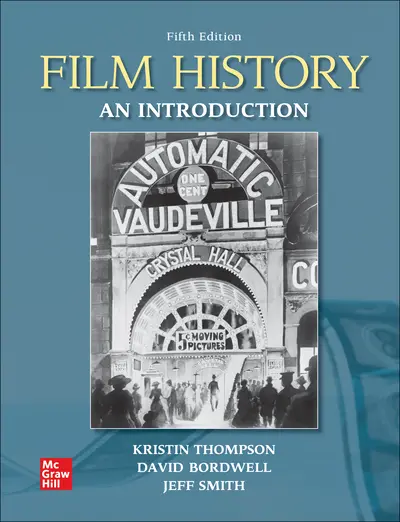My Account Details

ISBN10: 1260837475 | ISBN13: 9781260837476

* The estimated amount of time this product will be on the market is based on a number of factors, including faculty input to instructional design and the prior revision cycle and updates to academic research-which typically results in a revision cycle ranging from every two to four years for this product. Pricing subject to change at any time.
Instructor Information
Quick Actions (Only for Validated Instructor Accounts):
This new edition of Film History has been revised to include recent films, new examples, and updated comprehensive overviews of the rise of streaming services as purveyors of cinematic content as well as the massive disruptions of film production, distribution, and exhibition caused by the COVID-19 pandemic. It is a comprehensive global survey of film and its many genres – from drama and comedy to documentary and experimental – written by three of the discipline’s leading scholars. Concepts and events are illustrated with frame enlargements taken from the original sources, giving students more realistic and relevant points of reference than publicity stills. There are 100 new film clips with commentary in McGraw Hill Connect® – the web-based assignment and assessment platform that helps you connect your students to their coursework. Film History is a text that any serious film scholar – professor, undergraduate, or graduate student – will want to read and keep.
Chapter 1 – The Invention and Early Years of the Cinema, 1180s -1904
Chapter 2 – The International Expansion of the Cinema, 1905 – 1912
Chapter 3 – National Cinemas, Hollywood Classicism, and World War 1, 1913 – 1919
Part Two: The Late Silent Era, 1919-1929
Chapter 4 – France in the 1920s
Chapter 5 – Germany in the 1920s
Chapter 6 – Soviet Cinema in the 1920s
Chapter 7 – The Late Silent Era in Hollywood, 1920-1928
Chapter 8 – International Trends of the 1920s
Part Three: The Development of Sound Cinema, 1926-1945
Chapter 9 – The Introduction of Sound
Chapter 10 – The Hollywood Studio System, 1930-1945
Chapter 11 – Other Studio Systems
Chapter 12 – Cinema and the State: The USSR, Germany, and Italy, 1930-1945
Chapter 13 – France: Poetic Realism, The Popular Front, and the Occupation, 1930-1945
Chapter 14 – Leftist, Documentary, and Experimental Cinemas, 1930-1945
Part Four: The Postwar Era, 1945-1960s
Chapter 15 – American Cinema in the Postwar Era, 1945-1960
Chapter 16 – Postwar European Cinema: Neorealism and its Context, 1945-1959
Chapter 17 – Postwar European Cinema: France, Scandinavia, and Britain, 1945-1959
Chapter 18 – Postwar Cinema Beyond the West, 1945-1959
Chapter 19 – Art Cinema and the Idea of Authorship
Chapter 20 – New Waves and Young Cinemas, 1958-1967
Chapter 21 – Documentary and Experimental Cinema in the Post War Era, 1945-Mid 1960s
Part 5: The Contemporary Cinema Since the 1960s
Chapter 22 – Hollywood’s Fall and Rise, 1960-1980
Chapter 23 – Politically Critical Cinema of the 1960s and 1970s
Chapter 24 – Documentary and Experimental Cinema Since the Late 1960s
Chapter 25 – New Cinemas and New Developments: Europe and the USSR Since the 1970s
Chapter 26 – A Developing World: Continental and Subcontinental Cinemas Since 1970
Chapter 27 – Cinema Rising: Pacific Asia and Oceania Since 1970
Part 6: Cinema in the Age of New Media
Chapter 28 – American Cinema and the Entertainment Economy, the 1980s and After
Chapter 29 – Toward a Global Film Culture
Chapter 30 – Digital Technology and the Cinema
Accessibility
Creating accessible products is a priority for McGraw Hill. We make accessibility and adhering to WCAG AA guidelines a part of our day-to-day development efforts and product roadmaps.
For more information, visit our accessibility page, or contact us at accessibility@mheducation.com
Affordability
Reduce course material costs for your students while still providing full access to everything they need to be successful. It isn't too good to be true - it's Inclusive Access.
Need support? We're here to help - Get real-world support and resources every step of the way.